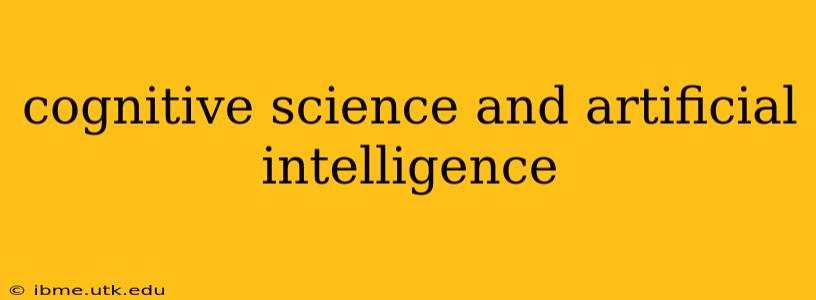Cognitive science and artificial intelligence (AI) are deeply intertwined fields, each informing and advancing the other. Understanding their relationship is crucial to grasping the future of both technology and our understanding of the human mind. This exploration delves into the core connections, highlighting how cognitive science provides the theoretical foundation for AI, while AI, in turn, offers powerful tools for testing and refining cognitive theories.
What is Cognitive Science?
Cognitive science is an interdisciplinary field that studies the mind and its processes. It draws on various disciplines, including psychology, neuroscience, linguistics, computer science, and philosophy, to explore how humans perceive, learn, remember, reason, and solve problems. The overarching goal is to build comprehensive models of cognition, explaining how the brain gives rise to intelligent behavior. This includes studying everything from basic sensory processing to higher-level cognitive functions like language understanding and decision-making.
What is Artificial Intelligence?
Artificial intelligence, in its broadest sense, aims to create machines that can perform tasks that typically require human intelligence. This includes tasks like visual perception, speech recognition, decision-making, and language translation. Different approaches to AI exist, but many rely on computational models inspired by our understanding of the human brain and cognitive processes.
How are Cognitive Science and AI Related?
The relationship between cognitive science and AI is symbiotic. Cognitive science provides the theoretical framework and empirical data that inform the design and development of AI systems. Conversely, AI offers powerful tools and techniques for testing and refining cognitive theories. Here's a breakdown:
1. Cognitive Science Informs AI Development
Cognitive science offers valuable insights into how humans perform intelligent tasks. AI researchers often draw inspiration from cognitive architectures – theoretical models of the human mind – to design AI systems. For instance:
- Human memory models: Understanding how human memory works (short-term, long-term, working memory) informs the design of AI systems with improved memory management and information retrieval capabilities.
- Human attention mechanisms: Studying human attention allows for the development of AI systems that can focus on relevant information and filter out distractions, leading to more efficient processing.
- Human problem-solving strategies: Analyzing human problem-solving techniques informs the design of AI algorithms capable of tackling complex problems creatively and efficiently.
2. AI Provides Tools for Cognitive Science Research
AI technologies provide powerful tools for cognitive scientists to test and refine their theories. For example:
- Computational modeling: AI techniques allow researchers to build computational models of cognitive processes, simulating human behavior and testing hypotheses.
- Brain-computer interfaces: These interfaces enable researchers to study brain activity directly, providing insights into the neural mechanisms underlying cognition.
- Big data analysis: AI-powered techniques for analyzing large datasets can reveal patterns and relationships in cognitive data that would be impossible to detect manually.
How does AI simulate human intelligence? What are its limitations?
AI simulates human intelligence by creating systems that can process information, learn from data, and make decisions. However, current AI systems primarily excel at narrow or specialized tasks. They lack the general intelligence, common sense reasoning, and adaptability of humans. Furthermore, ethical considerations regarding bias in algorithms and the potential societal impact of advanced AI are significant areas of ongoing discussion and research.
What are some examples of AI systems inspired by cognitive science?
Many contemporary AI systems are inspired by cognitive science principles. For instance, connectionist models, inspired by the structure of the brain, are used in various applications, including speech recognition and image processing. Bayesian networks, which model probabilistic reasoning, are applied in areas like medical diagnosis and risk assessment. Furthermore, reinforcement learning algorithms, inspired by animal learning, are used to train AI agents to perform complex tasks.
What are the future prospects of the Cognitive Science and AI partnership?
The future of this partnership holds immense potential. As AI systems become more sophisticated, they will provide even more powerful tools for cognitive science research. Simultaneously, deeper understanding of human cognition will enable the development of more robust, adaptable, and ethically sound AI systems. This collaborative effort promises to unravel the mysteries of the human mind while simultaneously creating transformative technologies. The convergence of these fields is not just promising, but essential for navigating the complex challenges and opportunities of the future.
